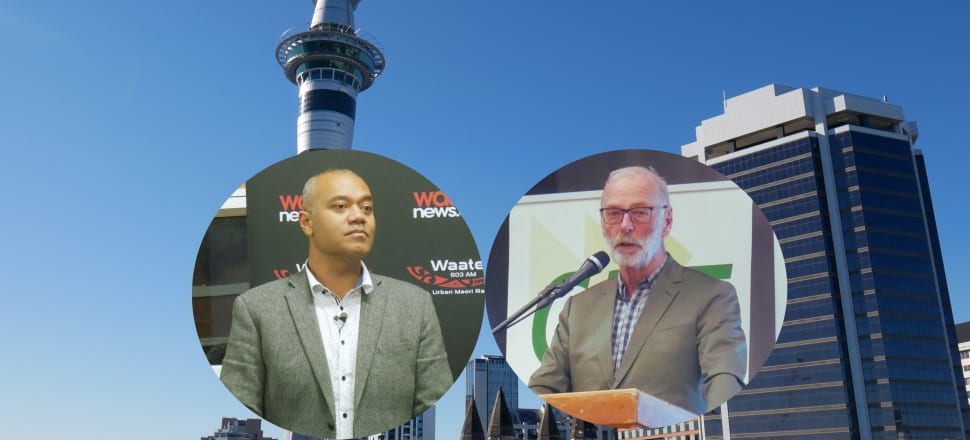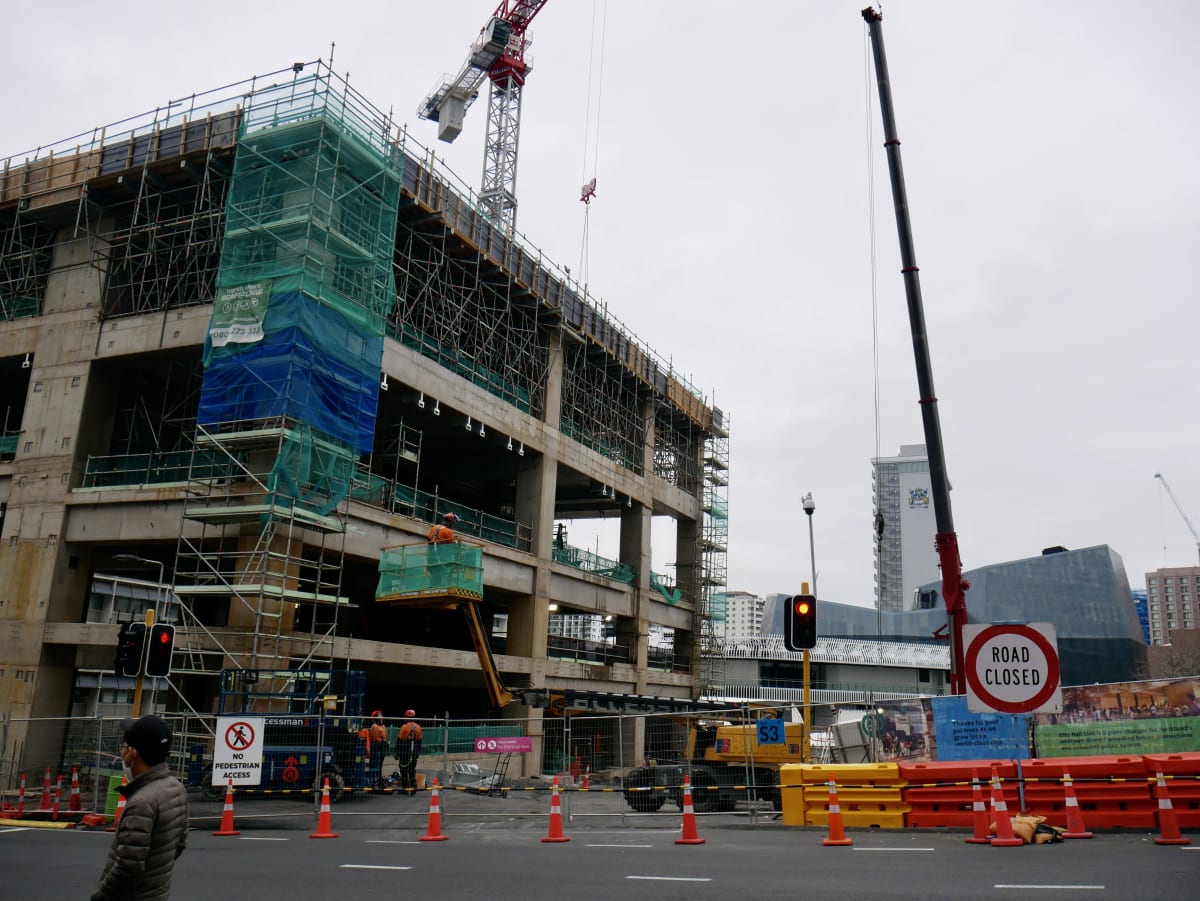
Rising, falling or freezing property rates are an area where mayoral candidates have tried to distinguish themselves - but how different are their campaign promises?
As Aucklanders start filling out their ballot sheets, a common question is what will this election cost the city.
To some it’s a question of financial prudence, with property owners eyeing general rates increases and suggestions of unprecedented costs on unfinished projects like the City Rail Link putting the council in the red.
To others the cost may be more abstract: the missed opportunities of bolstering public transport and social services as balms to the city’s growing cost of living and need to respond to climate change.
For most voters, front-runners Wayne Brown and Efeso Collins have already claimed their territory on differing sides of that debate, with Brown claiming to be the only mayoral candidate who will prioritise containing rates and Collins leading with big idea campaigns like his fares-free public transport.
With just over two weeks left in their campaign and the two front-runners close in the polls with Wayne Brown having pulled ahead according yesterday's Auckland Ratepayers’ Alliance - Curia poll, they will be preparing for the sprint home. At the same time, candidates and pundits have both been doubling down on their points of differentiation.
But how differently do Brown and Collins rate when it comes to rates?
While Brown has presented himself as the no-nonsense and pennywise choice who could finally get the big projects done and Collins has promised a more expansive menu of council services, it seems the gulf is not so wide when you look at promises around rates themselves.
Whether these promises come to fruition after the weekend of October 8 is another question entirely.
Property rates fund about $2 billion or 40 percent of council activities, which the council itself outlines as collecting rubbish, improving public transport, organising and facilitating events, maintaining parks, running libraries and other community facilities.
The 2022/2023 Budget has the council spending $2.8 billion on capital investment and $5.11 billion in operating costs, with an increase to rates of 3.5 percent.
Collins has gone on record saying he will keep increases to that level for the first year of his term, but hasn’t made hard and fast commitments beyond that.
He has said he will keep rates below the nationally deemed affordable level of 5 percent of median household income.
With rates currently reported at 3.37 percent of median household income, the increase Collins has allowed himself in the first year of a first term would represent around a $170 increase to most homeowners.
It’s less than the cost of a flat white a week - so will Collins be able to keep his promise on that?
One of his biggest platform swings is the promise of fares-free public transport, which he has said will have flow-on effects like getting customers into hospitality businesses around the city’s various town centres and cutting emissions.
It also sounds like a very expensive endeavour to launch while keeping within those rates bounds.
However, Collins pointed to a report written by Dr Jen McArthur, associate professor in urban infrastructure and policy at University College London.
McArthur’s report suggested fares-free public transport would cost $236 million per year, with potential increases should public transport use increase due to the scheme.
She laid out funding pathways that could be harnessed without rates hikes such as using central government budgets for health and climate change or reorganising existing council funding without reducing core services.
“In 2021 Auckland Transport invested $291 million into new roading infrastructure, suggesting that reallocating some of funds earmarked for road upgrades could be used to fund free public transport,” McArthur writes. “In turn, better public transport would use road space more efficiently and reduce the need for road capacity upgrades.”
Big projects could be paid for with a bit of a council garage sale, but Collins has also committed to keeping hold of strategic assets like Auckland Airport and the Ports of Auckland.
One potential source of revenue could come from lobbying central government to give local governments across the country a bit of a tax break.
“I will strongly advocate through a coalition of mayors that central government returns GST revenue from rates to local councils,” he said.
Collins said the council’s current long-term plan commits to a cap of 3.5 percent increases through 2023 and 2024, and he intends to stick to that barring unforeseen circumstances.
“Service reductions of $30m, asset sales targets, corporate savings and capital project deferrals have already been built into the budget for next year,” he said. “All things being equal and according to predictions, that is my commitment. Of course, any unexpected shocks will be dealt with as they always have been but they cannot by definition be predicted.”
He expects any new priorities for the next term of council will be able to be accommodated through the existing budget, with newer ideas being given a chance to be batted around the table after the enactment of the new long-term budget in 2024.
“The 10-year long-term plan in 2024 is a more appropriate place to consider the longer-term challenges and priorities, trade-offs and a wider consultation with Aucklanders on the longer-term direction of council,” he said.
He yesterday ruled out taking a fixed position further than that, saying it would be imprudent.
"I appreciate the support my rates policy has received from voters and I can see that Aucklanders are mature enough to appreciate that setting arbitrary rate policies without knowing what the future may bring is unnecessary, disingenuous and potentially dangerous,” he said.
Due to the fact rates decisions are made in consultation with the public and other councillors, Collins said it wasn’t right for candidates to make pledges about rates.
“Auckland Council needs courageous leadership, and given the governing body has a statutory responsibility to consult on its budgets as well as a responsibility to respond to global and national economic conditions, that will be what guides me as Mayor,” he said. “For this reason, I will not be locking Aucklanders into a position that is not informed by prudence and facts.”
Brown, on the other hand, has led with his rates promises, saying he is the “best choice for voters who want rates kept under control”.
Brown’s rates policies have generally been linked in with his criticisms of large council-affiliated projects with outstanding bills he fears could be laid at the feet of the Auckland ratepayer.
Chief among these is the City Rail Link, which has seen escalating costings over the years of its construction. The last cost breakdown City Rail Link Ltd gave was in April 2019 at $4.4 billion, up from $3.4 billion in 2014. These increases were blamed on competitive pressures within the construction industry and the expanding scope of the project.

But now with the pandemic having likely had its own expensive impacts on the costs and timeframe of the project, Brown has said other big projects like Collins’ fares-free public transport or the since pulled out Viv Beck’s Albert Park Tunnel reopening should be put on the back burner.
“We now know that there are some big bills coming - and that mess will need to be paid for,” he said. “I am the only candidate who hasn’t put up fantasy projects like a big new stadium, 100 percent ratepayer subsidies for public transport or a new tunnel under Albert Park. My promise is to get projects back on track and costs under control.”
Brown has had his own qualms with rates in his personal life, being involved in a years-long stoush over how much he owed on a Kerikeri development back when he was Far North mayor.
He’s also been vocal about cutting salaries within council, and leaned heavily on his history as chair of organisations like Auckland District Health Board, through which he delivered the hospital redevelopment project on budget.
Getting value for money has been a constant through-line in his campaign. He doesn’t think council has managed to do this, calling projects like the Karangahape Road cycleway wasteful.
“I’m boringly about the numbers,” he said last month at a mayoral debate at Karangahape Road’s Whammy Bar. “When I was up north we rolled out cycleways from coast to coast at $100 dollars a metre - the cycleway along here cost $12,000 a metre.”
But as media commentators like Russell Brown (who chaired the Karangahape Road debate) have pointed out, that price tag included extensive replacements to aged under-road plumbing and road resurfacing. It’s a different level of city works to the mostly gravel Twin Coast cycle trail in Northland.
And while Brown has labelled himself against undue rates hikes, he hasn’t nailed down the exact level of freeze or cap he will commit to.
Polling at 8 percent in the latest result, likely in third place with Viv Beck having dropped out, is fellow former 'engineer' Craig Lord. He says he will not vote for anything more than rises connected to the consumer price index and therefore pegged to inflation.
“Of course, who wouldn't love to have them reduced? But history tells us that's just a wild dream. Who knows, maybe I can be the one who achieves it,” he said.
Lord said he had had some in-depth conversation with councillor Desley Simpson about council expenditures.
“She is adamant that there are many more to be found, and she's done a good job with her team of finding lots to date,” he said. “I will work with her to do more.”
New Conservatives co-leader Ted Johnston meanwhile wants to lead a council that lives within its means.
“No new taxes,” he said. “Keep rates low, preferably no increase, by less wastage, incompetence, ideological and wish list spending in council.”
Along with this he wants to re-examine the rating system and scrap regional tax and congestion charges.
There’s been little argument from any of the candidates on the campaign trail that the council has little room to manoeuvre financially speaking.
However, there does seem to be a strange pattern across them - it’s the candidates who are the most vocally worried about council debts that are also selling their candidacy on opposing rates rises.
Like all of the issues brought forth on the stages of candidate debates, it will ultimately be up to the voters of Auckland to decide the direction the city is set to travel in.
And when it comes to rates, council revenue and provision of services, it may come down to how big you like your variety of local government. There’s the larger side, with Collins talking about ambitious transport plans and free bus rides, and there’s Brown putting the kibosh on new projects for the immediate future or Lord cutting council back to core services.







